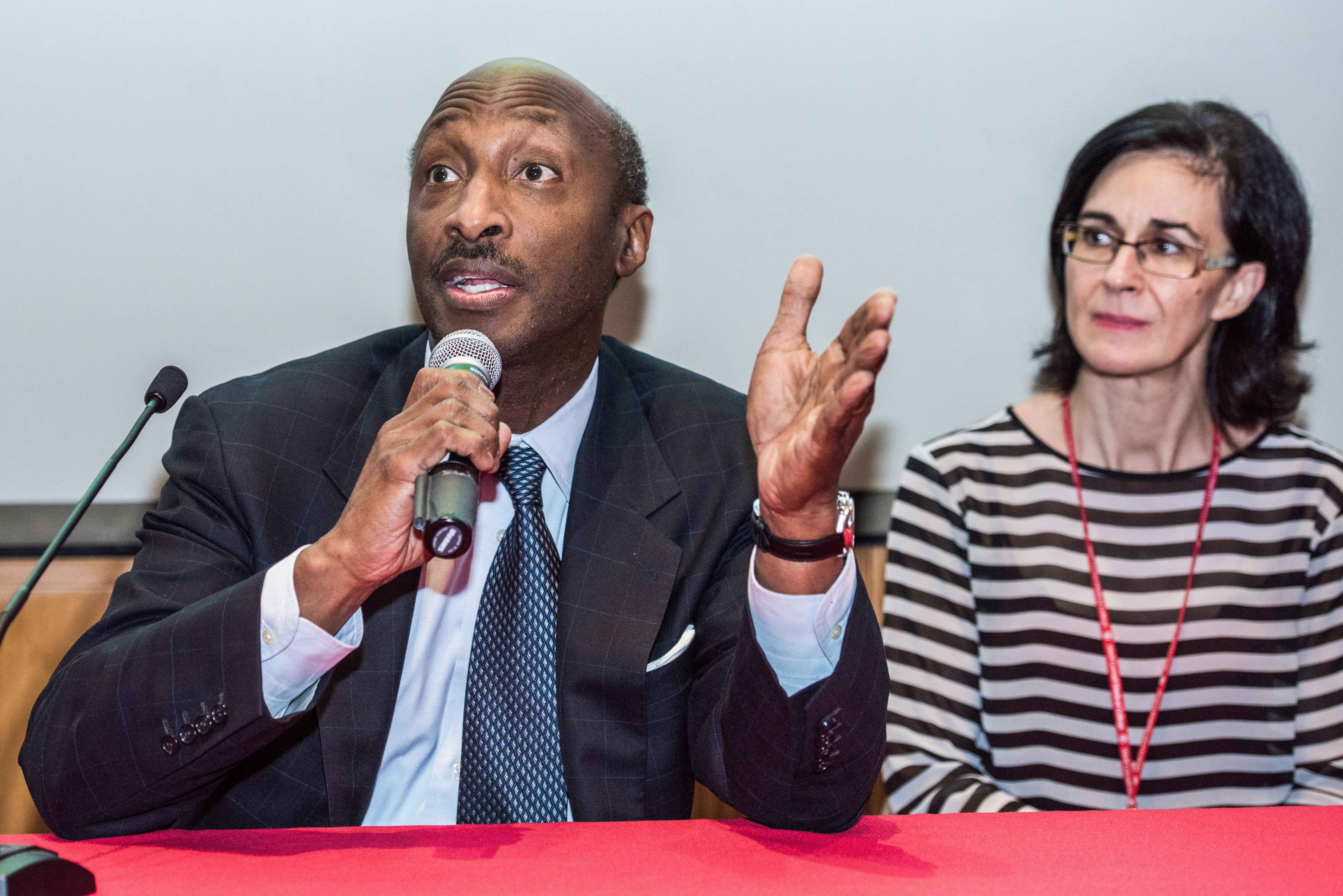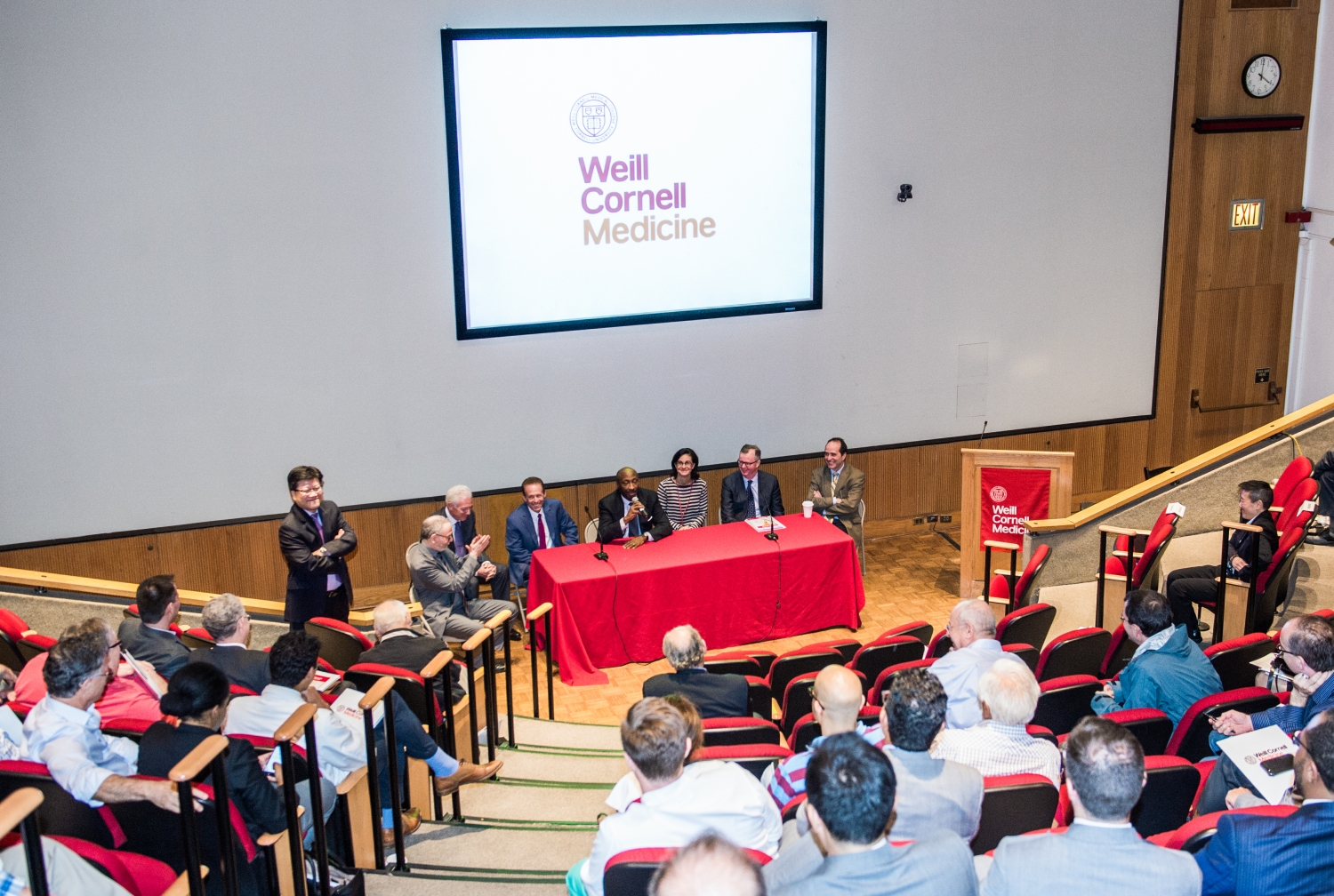Dr. Timothy McGraw calls himself “the accidental entrepreneur.”
Some seven years ago, the Weill Cornell Medicine biochemist began a side project investigating whether renegade hormones in the blood could be the culprit for the kind of insulin resistance that sparks type 2 diabetes. Dr. McGraw in 2014 pitched his hypothesis to Larry Schlossman, managing director of BioPharma Alliances and Research Collaborations at Weill Cornell Medicine. Schlossman engaged and negotiated with potential industry partners, and within a few months, Dr. McGraw and scientists in his laboratory began a dedicated research alliance with a team from European drugmaker UCB — which provided robust research funding to Dr. McGraw’s lab — to further explore the role of these hormones in insulin resistance. Now they are translating their findings into the development of new drugs.
“I really didn’t start out trying to be entrepreneurial,” Dr. McGraw, a professor of biochemistry and of biochemistry in cardiothoracic surgery at Weill Cornell Medicine who has received an honorarium from UCB Biosciences, a subsidiary of UCB, said to a crowd of some 230 faculty, trainees and students from Weill Cornell Medicine during a symposium on Oct. 9. “I was actually trying to drive our science forward.”
The goal of the Dean’s Inaugural Symposium on Opportunities for Entrepreneurship and Academic Drug Development, hosted at Weill Cornell Medicine’s Uris Auditorium, was to highlight the resources available to investigators to help them turn their research findings into new treatments and therapies for patients.
“Weill Cornell has implemented many initiatives in the last few years to really help our faculty translate their research findings — whether it’s fundamental, translational or clinical — into the clinic to have an impact on our patients,” said Dr. Augustine M.K. Choi, the Stephen and Suzanne Weiss Dean of Weill Cornell Medicine. “It’s a tough area to navigate. We need to continue to educate, inform and help our faculty steer through this maze.”

Keynote speaker Kenneth Frazier alongside Dr. Teresa Sanchez
Academic researchers traditionally excel at identifying new targets for drug development based on investigations into the biological and molecular mechanisms leading to disease, Dr. Choi said. The major hurdle to advancing these targets toward the clinic is the so-called “valley of death,” where biopharmaceutical companies and investors are reluctant to support work before the proof-of-concept stage, and government funding that academic scientists typically rely on isn’t available for that investigative stage.
“Simply put, discovering new medicines and vaccines requires time, commitment, embracing risk — and a whole lot of money,” said keynote speaker Kenneth Frazier, chairman and CEO of Merck. “For us, that means sustaining the confidence of our investors in research productivity over the long term. For you, that means obtaining funding for larger, longer and often riskier research efforts at a time when federal funding, unfortunately, is not keeping pace with the opportunities for scientific advances.”
That’s where Weill Cornell Medicine’s entrepreneurship initiatives fill the gap. One such initiative, the Tri-Institutional Therapeutics Discovery Institute — which Dr. Carl Nathan, dean of the Weill Cornell Graduate School of Medical Sciences and chairman of the Department of Microbiology and Immunology, helped conceptualize and is led by Dr. Michael Foley — is a drug-discovery incubator that helps to transform fundamental discoveries into promising small molecules and antibodies that may have therapeutic potential. The Tri-I TDI is a partnership between Weill Cornell Medicine, Memorial Sloan Kettering Cancer Center and The Rockefeller University, along with Takeda Pharmaceutical Company, Ltd. It accepts innovative projects from all three institutions and provides critical resources — including research funding and access to Takeda’s medicinal chemists — to demonstrate their therapeutic viability through preclinical proof-of-concept studies.
“We believe that we are one of the only academic centers on the planet with a true pipeline of novel programs moving forward,” Dr. Foley said, “that are staffed sensibly and funded properly to get the right answers to the scientific questions that are outstanding.”
Case in point: a project spearheaded by Dr. Teresa Sanchez, an assistant professor of pathology and laboratory medicine and of neuroscience in the Feil Family Brain and Mind Research Institute at Weill Cornell Medicine. During the symposium, Dr. Sanchez described how the Tri-I TDI, over the last year and a half, has helped advance her work developing a drug that would block a protein that makes blood vessels leaky after stroke. Medicinal chemists at the Tri-I TDI have synthesized compounds that may protect the vascular system, which she has tested in cells and in mice to demonstrate proof of concept.
“Our hope is that very soon, some of these molecules will be used for clinical development as novel vasoprotective therapies for stroke and other vascular disorders,” Dr. Sanchez said.
Dr. Sanchez is increasingly eying Bridge Medicines — established in October 2016 by Weill Cornell, Memorial Sloan Kettering and Rockefeller, in partnership with Takeda and healthcare investment firms Bay City Capital and Deerfield Management — as the next step for her project. Bridge Medicines builds upon the Tri-I TDI’s work, providing principal investigators with financial, operational and managerial support to move their research from Tri-I TDI’s pre-clinical proof-of-concept stage into in-human clinical trials. Dr. Sanchez said she has already had preliminary conversations with Bridge Medicines’ director, Dr. William Polvino.
“We view this absolutely like a relay race,” Dr. Polvino said, “where Bridge Medicines is running full speed by the time TDI is ready to hand off the baton.”
Working in tandem with Tri-I TDI and Bridge Medicines is the Office of BioPharma Alliances and Research Collaborations, headed by Schlossman.
“We have a fully integrated entrepreneurship ecosystem here at Weill Cornell,” Schlossman said. “And we really work together as a team and help faculty decide what is the best path forward for their project and technology.”
That might mean securing funding through the Daedalus Fund for Innovation, which provides $100,000 and $300,000 one-year grants to Weill Cornell Medicine investigators to help them advance their promising applied and translational research projects and emerging technologies that have commercial potential. This initiative, which Schlossman initiated and oversees, also serves as a feeder for the Tri-I TDI.
Or it might mean establishing research alliances with pharmaceutical companies, akin to the one between Dr. McGraw and UCB.
But regardless of the entrepreneurial path forward, Weill Cornell Medicine remains committed to helping investigators commercialize their science. That also means protecting their inventions, a process that Cornell University’s Center for Technology Licensing is responsible for.
“We provide services to the inventors for intellectual property protection,” said Dr. Brian Kelly, director of CTL’s Weill Cornell Medicine office. “We are going to evaluate those inventions; we’re going to protect those inventions by filing patent applications or by registering copyrights. We are going to sit down with you. We are going to say, ‘Who do we think will be best able to commercialize this invention?’”
And for students, trainees and faculty who want to commercialize their discoveries but are not quite sure how to get there, CTL and the Office of BioPharma Alliance and Research Collaborations — the latter of which through the Dean’s Entrepreneurship Lab, or eLab — provide educational resources that help them create start-up companies.
“We are very proud of what we’ve done at Weill Cornell,” Dr. Choi said. “It’s a changing landscape, and we’d like to continue to lead in this area.”

